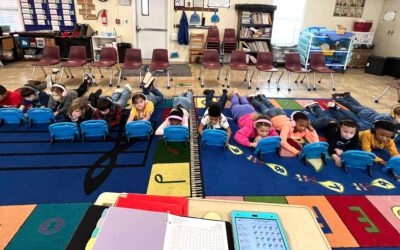I am thankful for so many things this year. My oldest son got married, bought a home, and adopted a 2-year-old that they had been foster-parenting since birth (my first grandchild!). Our younger son is teaching high school math, and is head coach for the school’s tennis team that should start the season ranked #1 in the state. Our daughter is in her freshman year of college, and enjoying the campus living experience. My wife is doing executive coaching and also working to ensure the gym we own recovers from the pandemic; she and I are empty nesters for the first time!
I’m also thankful for many things happening around the country. Over 40 states have now adopted K-12 computer science standards—accelerating the movement over the last few years toward recognizing computer science as an essential academic subject to be taught in our nation’s schools. In a recent survey, over 65% of teachers, principals and superintendents agreed that computer science is as important to teach as the other core subject areas such as math, language arts, science and social studies. This is not only a national security issue, as the United States lags far behind the number of computer science graduates each year in both India and China, but also an important issue of equity. Exposing our youngest students to computer science concepts and lessons helps to ensure that all students—regardless of income, gender, or race—have the opportunity to develop an appreciation for this subject area which can lead to enhanced career opportunities later in life.
Additionally, I am thankful for the increased attention on closing the digital divide—and the recognition that closing this equity gap involves not just providing equality of access to devices and broadband access, but also to adequate digital skills instruction. Significant initiatives at the state and federal levels are in process to tackle this important issue, helping to allow underserved communities to develop the access and skills to participate as members of our increasingly digital economy and society. For over 20 years, Learning.com has focused on equipping students with digital skills essential to thriving in a digital world, and now that mission is being embraced by educators, administrators and governments.
At Learning.com, we also have many things to be thankful for. I continue to be so thankful for the loyalty of our customers. Last year was the best year in our history in terms of customer retention…and this year has been even better! Our team has worked hard over the last few years to drive up customer satisfaction and retention—customer retention is truly a company-wide metric. And in addition, for the 6th year in the last 7, Learning.com was recognized as a Top Workplace in Oregon and SW Washington. I am so thankful for the culture that our executive team and our employees have created, especially coming through all the challenges of the last 2+ years. I am honored to lead this amazing team.
Happy Thanksgiving!

Keith Oelrich
CEO
Keith Oelrich joined Learning.com as CEO in 2012. A pioneer in the K-12 online education market since 2000, Keith has served as CEO of several companies which have collectively provided K-12 online education programs to thousands of districts, tens of thousands of schools and millions of students and their families.
Further Reading
Digital Skills for North Carolina Students
In our district, like most others, the use of digital learning tools has catapulted since the pandemic. With students online more than ever, it’s...
Why Teaching Kids to Code Supports Community Development
Teaching kids to code undoubtedly prepares them for the future of work. But what does this mean for the communities that helped them become career...
Enhancing Digital Citizenship by Understanding Confirmation Bias
Teaching confirmation bias as part of the digital literacy curriculum in schools is essential in today's information-saturated world. Confirmation...




